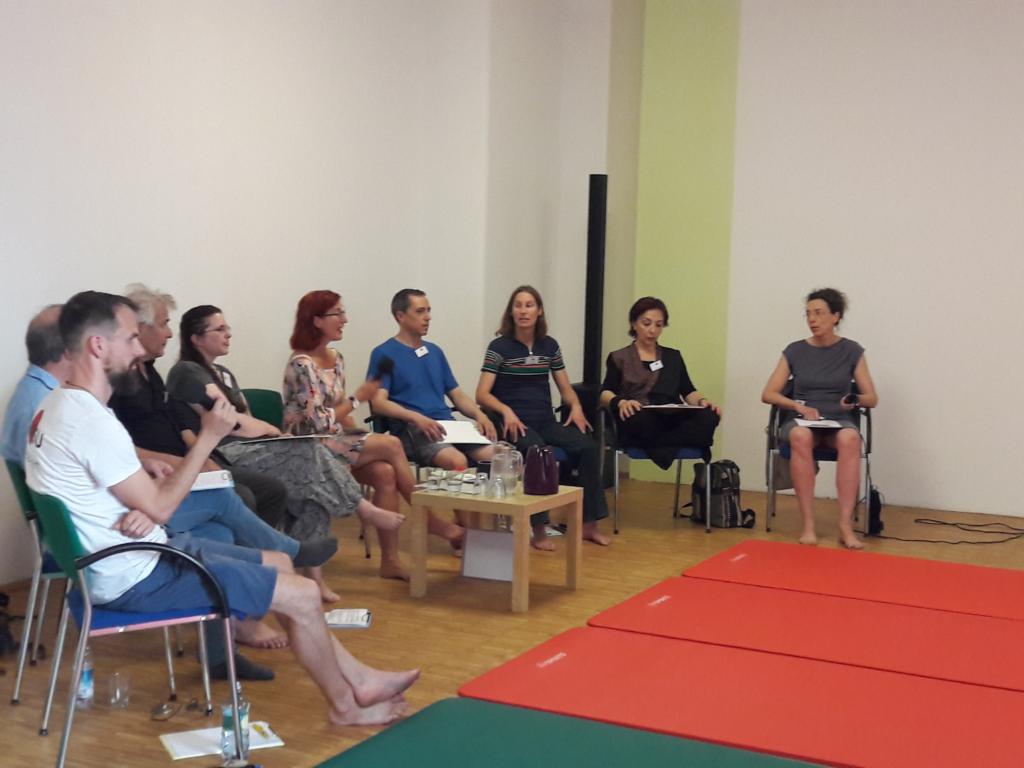Does Shiatsu need Research? If so, what kind of Research does Shiatsu need? (Dr. Eduard Tripp, Karin Koers, Achim Schrievers)

The panel also considered treatment documentation, ie case reports that demonstrate the positive effects of Shiatsu. As Achim Schrievers and Dr. Eduard Tripp emphasized, it is important that such documentation take into account both the objectives of Shiatsu and the existing legal framework. Though Shiatsu improves some complaints and illnesses, the focus of Shiatsu is clearly on the holistic treatment of the human being. The goal is the energetic harmonization of the treated person and the stimulation of self-regulating functions. On this basis, many things can change and even diseases can be managed.

The experience of Shiatsu clients, as collected in the project „Depth Interviews – Treasures of Shiatsu“, shows that the usual division into wellness, health promotion and therapy does not do justice to Shiatsu. In order to grasp Shiatsu in its entirety, it is necessary to immerse oneself in the subjective experience. This is where the limits of science reveal themselves, i.e. the intention to examine and understand life processes externally or „objectively“.
For example, even if a sex researcher evaluates all data relevant to sexuality, he will never grasp the secret inherent in love. A link is needed between the experience itself and external scientific observation of the process. Science uses the mind and thinking to investigate life processes. The value of Shiatsu however, lies partly in the sinking into deep consciousness, which coincides with the cessation of thought. These two paths – comprehension through experience and understanding through scientific observation – should ideally complement rather than oppose each other.
Fernando Cabo cited the example of Dr. Edzard Ernst, former holder of the chair of alternative medicine at Exeter University in Great Britain, to show that science can also be used unfairly. Edzard Ernst vehemently opposes all methods that do not have scientific evidence and explicitly warns against Shiatsu: „the possible benefit is not worth the risk“. He has even argued that Shiatsu is a high risk method, since there is a strong possibility of negative reactions, including stroke.
Problematically, his conclusions are not justified, since his primary source for risk assessment presents an almost contrary result and his secondary source refers to a massage chair, a „shiatsu type massager“. For those who do not penetrate any deeper into the subject or those who trust doctors and professors more than Shiatsu practitioners, this might constitute a reason to avoid Shiatsu. Such tendentious representations can however, be countered with correct research results.
Fernando Cabo further argued that Shiatsu research is in a poor state. He cited several studies that allegedly investigate Shiatsu but have nothing to do with Shiatsu, instead using some form of acupressure, some even partly carried out with instruments. His wish, he stated, and the reason he participates in the Shiatsu Research Network, is to establish a clear research protocol for Shiatsu to distinguish it from other methods.
As important as the demarcation is, common ground is also vital. Dr. Tripp explained that studies are very helpful for the professional recognition of Shiatsu, since they demonstrate the professionalism of Shiatsu as well as its safety and effectiveness. At this level, studies in the field of acupressure, and possibly even acupuncture, are also helpful if they prove the effectiveness of, for example, Pericardium 8 (P 8). Since these methods are based on some of the same principles as Shiatsu, proving the efficacy of P 8 for various forms of nausea is also helpful for Shiatsu. What is needed is a recognized and regulated European profession: cross-country, cross-association and even cross-method. For this, common forces are necessary – and here the strength of the community and the spirit of Shiatsu can manifest itself.
Literature directly related to this article:
- Cabo, F.: Shiatsu and Acupressure: Two Different and Distinct Techniques https://www.ncbi.nlm.nih.gov/pmc/articles/PMC5988345
- Kraft / Koers: Pilot Study Shiatsu and Mindfulness (Results and Summary) https://www.shiatsu-gsd.de/node/8053
- Koers: Shiatsu and mental well-being – a study – blog article http://fumana.de/b_studie-shiatsu
- Schrievers, A., Koers, K. Münch, S., Endrich, B: Project In-depth Interviews – Summary https://www.shiatsu-gsd.de/2017-09-15-Was-bewirkt-Shiatsu
- Schrievers, J. Schätze des Shiatsu, Bod Verlag 2018
- Stefanini, P.: Modeling Meridians Within the Quantum Field Theory https://doi.org/10.1016/j.jams.2018.06.009
- Tripp, E.: How dangerous is Shiatsu? Science and Polemics /index.php/info-pool/studien/480-how-dangerous-is-shiatsu-science-and-polemics
General links:
- Shiatsu Research Network SRN https://shiatsu-research-network.org/j39/index.php
- Collection of SRN publications on Shiatsu: https://www.europeanshiatsucongress.eu/science-library
- Panel discussion sound file: https://www.youtube.com/watch?v=Agg359D8quY
About the authors:
- Eduard Tripp, Psychotherapist, supervisor and Shiatsu teacher, director of Shiatsu Austria, professional representative in the Austrian Shiatsu association and author of various professional articles.
- Achim Schrievers, Shiatsu, Taiji and Qigong teacher, author of various books and specialist articles. He has studied sports science and spent two years in Japan studying the interplay between mind and body.
- Karin Koers, Graduate information management, B.Sc. in complementary therapy, Shiatsu practitioner (GSD), coach (FH) and author. Research for Shiatsu as a complementary method for stress-related strain through a combination of physical (Shiatsu) treatment and cognitive approaches (solution-oriented, short-term counselling and mindfulness exercises).
Pages: 1 2